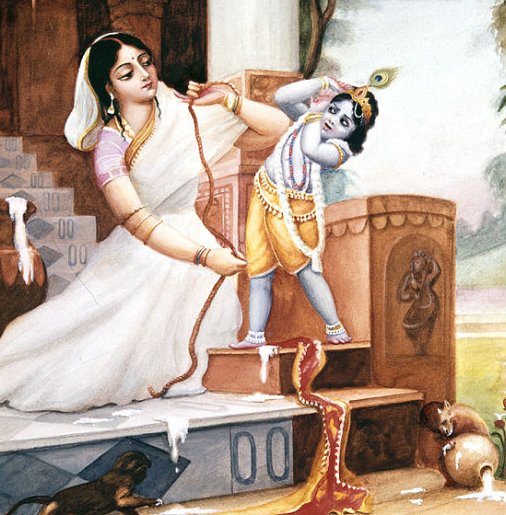
The Śrī Dāmodarāṣṭakaṁ prayer with eight slokas (verses) is sung daily during the month of Damodara. This is verse 2, with purport explained by Visnujana Swami.
रुदन्तं मुहुर् नेत्र-युग्मं मृजन्तम्
कराम्भोज-युग्मेन सातङ्क-नेत्रम्
मुहुः श्वास-कम्प-त्रिरेखाङ्क-कण्ठ
स्थित-ग्रैवं दामोदरं भक्ति-बद्धम् ॥
rudantaḿ muhur netra-yugmaḿ mṛjantam
karāmbhoja-yugmena sātańka-netram
muhuḥ śvāsa-kampa-trirekhāńka-kaṇṭha-
sthita-graivaḿ dāmodaraḿ bhakti-baddham ॥
rudantam–crying; muhuḥ–again and again; netra-yugmam–His two eyes; mṛjantam–rubbing; kara-ambhoja-yugmena–with His two lotus-like hands; sa-ātańka-netram–with very fearful eyes; muhuḥ–again and again; śvāsa–quick breathing and sighing; kampa–trembling; tri-rekhaańka-kaṇṭha–neck marked with three lines (just like a conchshell); sthita–situated; graiva–pearl necklaces and other neck-ornaments; dāma-udaram–unto He with a rope around His belly; bhakti-baddham– who is bound by devotion.
Translation
2) Upon seeing His mothers whipping stick, He cried and rubbed His eyes again and again with His two lotus hands. His eyes were fearful and His breathing quick, and as Mother Yasoda bound His belly with ropes, He shivered in fright and His pearl necklace shook. To this Supreme Lord, Sri Damodara, who is bound with His devotee’s love, I offer my humble obeisances.
Purport
The second verse continues describing the lila-visesa. He is crying (rudantam) because He sees the stick in Mother Yasoda’s hand. Perceiving that she may strike Him, He appears fearful, hoping her natural empathy may save Him from punishment. Due to fear, tears are forming in His eyes, so He rubs his eyes with his lotus-like hands in the normal manner of children to wipe away the tears that are beginning to flow.
Then (satanka-netram) His fearful eyes reveal how much He is dreading punishment. It also indicates His glancing here and there in great fear, trying to avoid being punished. The confidential pastime is revealed in this way. Therefore, due to his continual sobbing He is trembling, (muhuh svasa-kampa) and thus, (sthita-graiva) the pearl necklaces and earrings that adorn Him are also shaking.
The Supreme Personality of Godhead, who is feared by everyone, has become fearful of Mother Yasoda. In this way, Mother Yasoda now becomes greater than God, more powerful than Krishna. The Mayavadi philosophers want to become one with God, but in Vaishnava philosophy the devotee becomes more than Krishna, and Krishna accepts this. He elevates His devotee beyond His own position, just as Arjuna became the hero at Kurukshetra and Krishna was simply his chariot driver. Actually, Krishna was the hero, but He gave the credit to His devotee, because He takes pleasure in seeing His devotee in a greater position than Himself.
“When Mother Yasoda was trying to bind the offending child, she saw that the rope was short by the measurement of two fingers. Thus she brought another rope to join it. This new rope was also short by two fingers, and when another rope was joined to it, it was still two fingers short. As many ropes as she joined, all of them failed; their shortness could not be overcome.”
The reason for the failure of the rope to bind Him is bhakti-baddham. He can be bound only with devotion. No other power can bind Him. The significance of the two fingers is also very important. The first finger represents the devotee’s sincere endeavor of love and unflinching determination to attain Krishna and thereby please Him. The second finger represents Krishna’s supreme mercy by which He agrees to be bound by His devotee’s pure love.
So He is bound with a rope around the belly (damodaram) and tied to a wooden grinding mortar. This reveals the Lord’s excellent quality of coming under the control of His devotee’s pure love (bhakti-baddham). He responds to bhakti in two ways. From Mother Yasoda’s point of view, He is conquered and bound by her loving parental devotion, vatsalya. From His own point of view, He willingly allows her to bind Him, although no rope can ever bind Him.
“Because of Mother Yasoda’s hard labor, her whole body became covered with perspiration, and the flowers and comb were falling from her hair. When child Krishna saw His mother thus fatigued, He became merciful to her and agreed to be bound. O Maharaja Pariksit, this entire universe, with its great exalted demigods like Lord Shiva, Lord Brahma and Lord Indra, is under the control of the Supreme Personality of Godhead. Yet the Supreme Lord has one transcendental attribute: He comes under the control of His devotees. This was now exhibited by Krishna in this pastime.”







Speak Your Mind